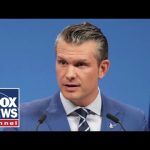In the current political climate, accountability appears to be a scarce commodity, particularly among those who wield significant influence in the corridors of power. Recent developments in Washington D.C. have once again highlighted the need for a closer examination of those entrusted with safeguarding national interests. The withdrawal of security clearances from high-profile figures like Hillary Clinton and others by President Trump is a step in the right direction. Trump’s decision to strip these clearances after a pattern of dubious behavior reflects a commitment to ensuring those with access to sensitive information can be trusted.
The conversation often circles back to the implications of false narratives propagated by influential voices. During past electoral cycles, key players in government and the media engaged in campaigns that bordered on disinformation. From being labeled a “puppet of Putin” to having Russian ties unfoundedly attributed, such accusations were often hurled at political opponents without tangible evidence. This tactic of politicized blame places a burden not just on the accused, but also on the general public, who deserve transparency and truth from leadership and media alike.
Perhaps the most alarming aspect of recent revelations is the misconduct associated with the FISA process, particularly during the investigation known as Crossfire Hurricane. The misuse of manufactured testimony by U.S. attorneys and FBI agents to obtain surveillance warrants is troubling. If these officials knowingly presented false information to justify spying on American citizens, it not only breached legal protocol but also shook public trust in upholding justice. This misuse of power should not go unpunished.
The retraction of access for individuals involved in such questionable activities sends a critical message: integrity and accountability are not optional for those in positions of power. The central concern remains whether these actions will lead to more rigorous investigations and, potentially, prosecutions. The declaration that crimes will be prosecuted implies a commitment to upholding the rule of law, promising a thorough investigation into past indiscretions.
In the broader picture, these developments should serve as a wake-up call for constant vigilance. The maintenance of a free and fair society hinges on the actions of honest public servants. By holding those who deviate from this standard accountable, there’s hope that transparency and justice will ultimately prevail. The American public must stay informed and demand high standards from those who represent them, ensuring that accountability and honesty remain cornerstones of the democratic process.




